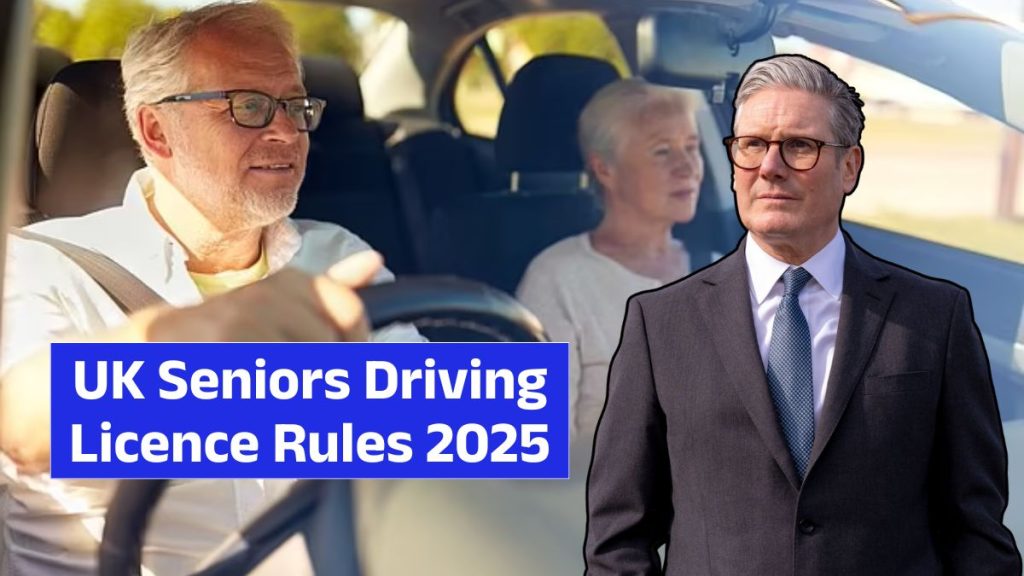Driving in the UK is more than a way to travel it is a symbol of independence and freedom, especially for senior citizens. It allows older drivers to visit family, attend appointments, and stay engaged in their communities. But starting in 2025, significant reforms will reshape the way older drivers maintain their licences.
The government has announced that UK seniors will face new driving licence requirements, with medical checks, vision tests, and even mandatory driving assessments forming part of the updated system. The goal is to ensure road safety while helping seniors remain confident and capable drivers for as long as possible.
Why Are the Rules Changing?

The UK’s population is ageing, and the number of drivers over 60 has risen sharply. While experience is a clear advantage on the road, age-related health conditions such as declining eyesight, slower reflexes, and chronic illnesses increase risks.
The government and the Driver and Vehicle Licensing Agency (DVLA) argue that stricter checks are needed to balance independence with public safety. By identifying potential health issues early, drivers can get treatment or make adaptations, allowing them to continue driving safely.
Who Will Be Affected by the Reforms?
The changes target several age groups:
- 62 and above: Mandatory medical self-declaration and proof of recent vision tests.
- 65 and above: Compulsory driving assessments to evaluate real-world skills.
- 70 and above: Licence renewals will include stricter screenings and possible cognitive checks.
This tiered approach ensures that checks become more detailed as drivers grow older, reflecting the natural health challenges of ageing.
Medical Fitness Requirements
From 2025, all drivers over 62 will need to complete a mandatory health self-declaration form at licence renewal.
- Ongoing conditions like diabetes, epilepsy, or heart disease must be declared.
- In some cases, the DVLA may request a GP fitness-to-drive certificate.
- Failure to disclose medical issues could result in fines and even invalidate insurance.
This move is designed to make the system more transparent and ensure that drivers are medically safe to be on the roads.
New Vision Standards
Clear eyesight is essential for road safety, and the new rules tighten requirements:
- Proof of a recent eye test will be mandatory when renewing a licence.
- Drivers must demonstrate they can read a number plate from 20 metres.
- Those who wear glasses or have undergone surgery, such as cataract removal, may need extra documentation.
These changes ensure that no senior driver is unknowingly putting themselves—or others—at risk due to poor vision.
Mandatory Driving Assessments for Over-65s
Perhaps the most significant reform is the driving assessment for those aged 65 and older.
- The assessment is not a full driving test but a practical evaluation.
- It measures hazard perception, reaction time, decision-making, and control of the vehicle.
- Drivers with specific medical conditions may also be referred earlier.
The system is designed to be supportive. If a driver struggles in some areas, they may be advised to take extra training rather than losing their licence immediately.
Licence Renewal Changes
Currently, drivers renew their licence at 70, then every three years. Under the new rules:
- Some drivers may be placed on a shorter three-year renewal cycle as early as age 62 if they declare health issues.
- Renewals will involve more thorough checks, including medical and vision tests.
- Cognitive screening may also be introduced for drivers over 70, particularly those with neurological concerns.
These measures mean older drivers will be monitored more regularly, helping spot issues before they escalate.
Insurance Implications for Older Drivers
The reforms are also expected to impact car insurance policies:
- Insurers may require proof of medical clearance before offering coverage.
- Drivers who pass assessments could enjoy discounted premiums.
- Conversely, those who fail or declare certain conditions may face higher costs.
This shows how the changes will affect not just licensing but also the broader financial responsibilities of senior drivers.
What Happens If You Fail an Assessment?
Failing an assessment will not automatically mean losing your licence. Instead:
- You may be referred for additional training.
- You will have the opportunity to retake the assessment.
- Licences will only be revoked if a driver is deemed medically unfit or fails multiple times.
The DVLA stresses that the aim is support, not punishment. The reforms are about keeping drivers safe and independent for as long as possible.
Balancing Independence and Safety
For seniors, the ability to drive is tied closely to independence. The government recognises this and has structured the reforms to be balanced and supportive rather than restrictive.
The measures seek to:
- Protect vulnerable drivers and other road users.
- Provide early health interventions.
- Help seniors access training and support if their skills decline.
In short, these reforms are designed to prolong safe driving, not end it prematurely.
5 FAQs
Q1: At what age do the new licence requirements apply?
A: From 2025, medical self-declarations and vision checks start at age 62, mandatory driving assessments at 65, and stricter renewal screenings at 70.
Q2: What is included in the mandatory driving assessment for over-65s?
A: It is a short evaluation of hazard perception, reaction time, and vehicle control, not a full driving test.
Q3: Will insurance premiums increase for senior drivers?
A: Possibly. Drivers with health conditions may see higher premiums, but those who pass assessments could benefit from discounts.
Q4: What happens if I fail a driving assessment?
A: You may be offered training and a chance to retake. A licence would only be revoked if you’re found medically unfit or repeatedly fail.
Q5: Why is the government introducing these changes?
A: To enhance road safety, detect health issues earlier, and ensure senior drivers remain both safe and independent on UK roads.














